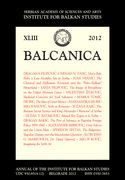The Port of Salonica in Yugoslav Foreign Policy 1919-1941
The Port of Salonica in Yugoslav Foreign Policy 1919-1941
Author(s): Dragan BakićSubject(s): History
Published by: Balkanološki institut - Srpska akademija nauka i umetnosti
Keywords: Salonica (Thessaloniki); free port; Yugoslavia; Greece; Balkans; railway; se-curity; World War
Summary/Abstract: This paper explores the importance of the Greek port of Salonica (Thessaloniki) for Yugoslav foreign policy-makers during the interwar period. It suggests that, apart from economic interests, namely securing trade facilities in the port and transport facilities offered by the Ghevgheli-Salonica railway connecting the Yugo-slav territory with Salonica, there were security considerations which accounted for Belgrade’s special interest in this matter. These stemmed from two reasons - Serbia’s painful experience from the Great War on which occasion the cutting off of the route for Salonica had had dire consequences for the Serbian Army and the post-war strategic situation whereby Yugoslavia was nearly ringed by hostile and potentially hostile neighbours which was a constant reminder of the immediate past and made both po-litical and military leadership envisage a potential renewed need to retreat to Salonica in a general conflict. The events prior to and during the Second World War seem to have vindicated such preoccupations of Yugoslav policy-makers. All the Great Powers involved in the conflict in the Balkans realised the significance attached to Salonica in Belgrade and tried to utilise it for their own ends. Throughout these turbulent events Prince Paul and his government did not demonstrate an inclination to exploit the situation in order to achieve territorial aggrandisement but rather reacted with restraint being vitally concerned that neither Italy nor Germany took possession of Salonica and thus encircled Yugoslavia completely leaving her at their mercy.
Journal: BALCANICA
- Issue Year: 2012
- Issue No: 43
- Page Range: 191-220
- Page Count: 30
- Language: English

